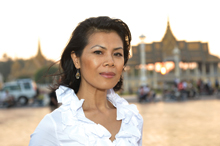Daughter of the Killing Fields

After the country’s ruling regime held her captive, killed her parents, and executed people in front of her and other imprisoned children, one might assume that Theary Seng, ’00, would want to stay far from Cambodia.
Yet she has chosen the country of her birth as her permanent home, and is the founder of the Cambodian Center for Justice & Reconciliation and the founding president of CIVICUS: Center for Cambodian Civic Education. Her goal with the two organizations is to pursue justice for people who were victimized by the Khmer Rouge or whose family members were buried in the regime’s "killing fields." Seng also hopes to see a revitalization of her homeland.
"Cambodia has been known for its killing fields and only for the killing fields. But within the past several years it is also known for its beauty, for its history, its temples, for tourism."
The southeast Asian country also is known for the Khmer Rouge Tribunal (also called the Extraordinary Chambers in the Courts of Cambodia, or ECCC). The court tries serious crimes perpetrated during the 1975–79 Khmer Rouge regime, which was responsible for the genocide of an estimated 1.7 million people.
"Yes, we are trying crimes that were perpetrated against Cambodians," says Seng, who moved with surviving family members to Grand Rapids when she was nine and to southern California after that. "But they were really crimes against humanity, against human dignity."
Seng—author of the memoir Daughter of the Killing Fields (Fusion Press London, 2005), which will be available for the first time in North America in an updated version to be published by Seven Stories Press (NYC) later this year—became the first victim of the Khmer Rouge to apply and be accepted as an ECCC-recognized civil party. In 2008, she testified against the most senior surviving Khmer Rouge leader, Nuon Chea, also known as Brother Number Two because he was second in command to Khmer Rouge leader Pol Pot. Seng testified at the pretrial hearing of Chea, whose UN trial for crimes against humanity began during the summer.
"Under the reign of Mr. Nuon Chea," Seng said in her testimony, "when I was seven years old—my brother Daravuth [who also was imprisoned] even younger at four years old—I was put in prison where there was no due process. Arbitrary arrest, no charges made or given, arbitrary detention, inhumane conditions, shackles. The graves were my playground."
Seng’s training as a lawyer has given her a keener insight into the tribunal process in Cambodia, as well as a platform for speaking to broad audiences. Her memoir and her testimony have made Seng one of the most visible Cambodians to speak on behalf of the Khmer Rouge’s victims. She speaks frequently at international conferences and in the media, including CNN, the BBC, and many documentary films.
"When I was at Michigan Law School," she recalls, "I knew I wanted to be back in Cambodia. Part of wanting to be a lawyer was wanting to give voice to the entanglements back in Cambodia."—KV